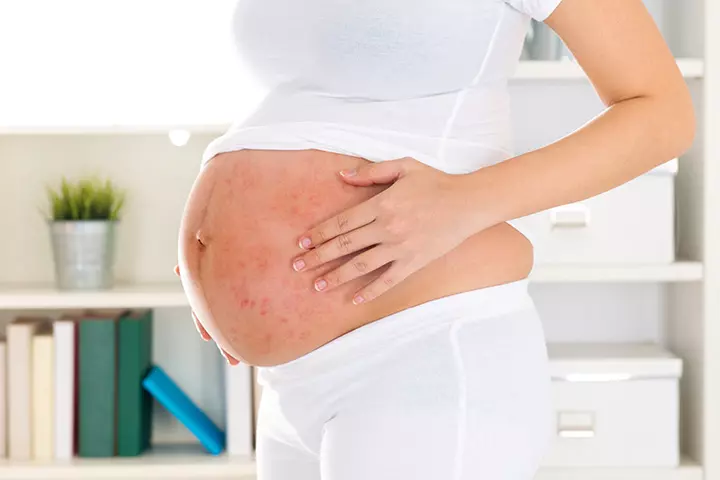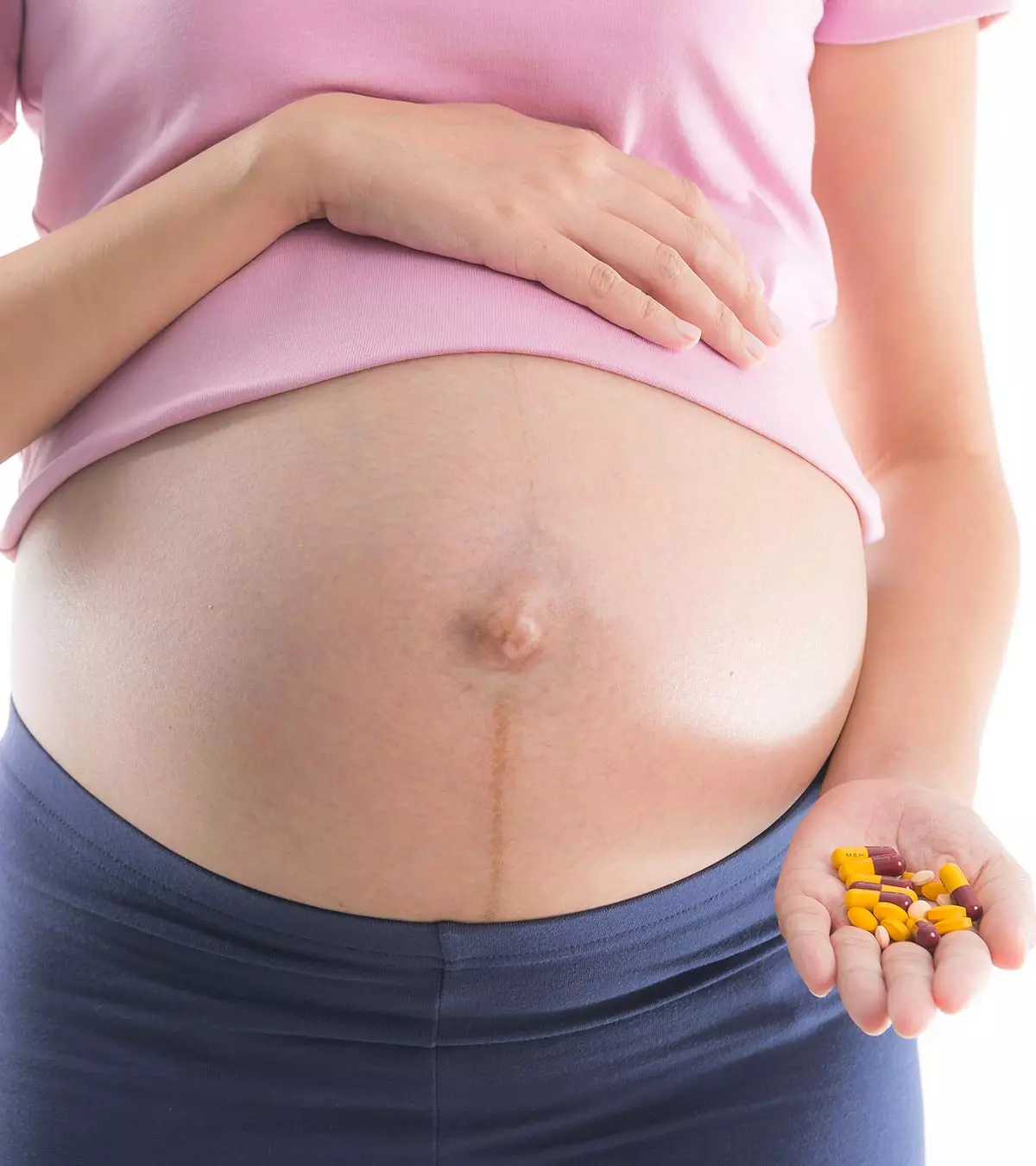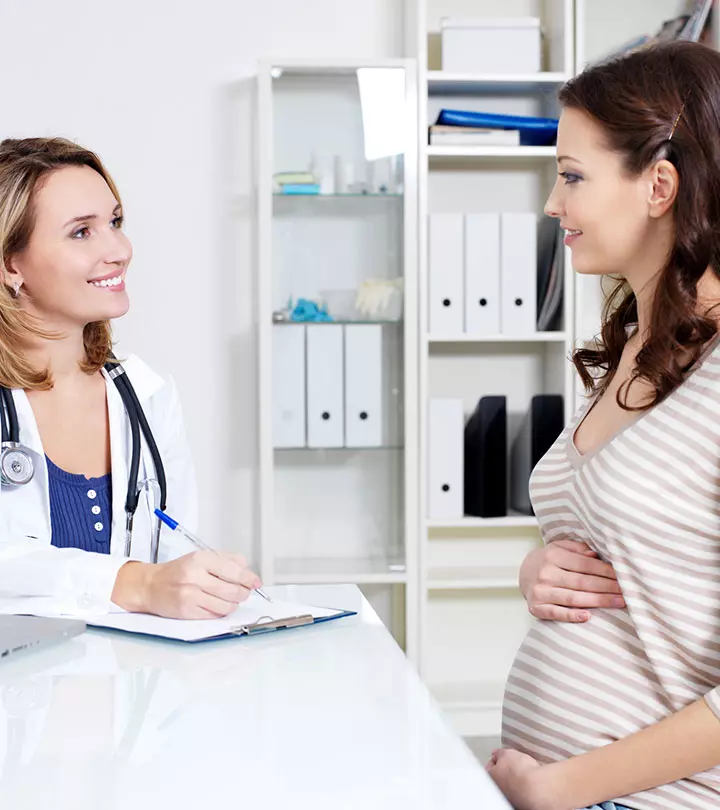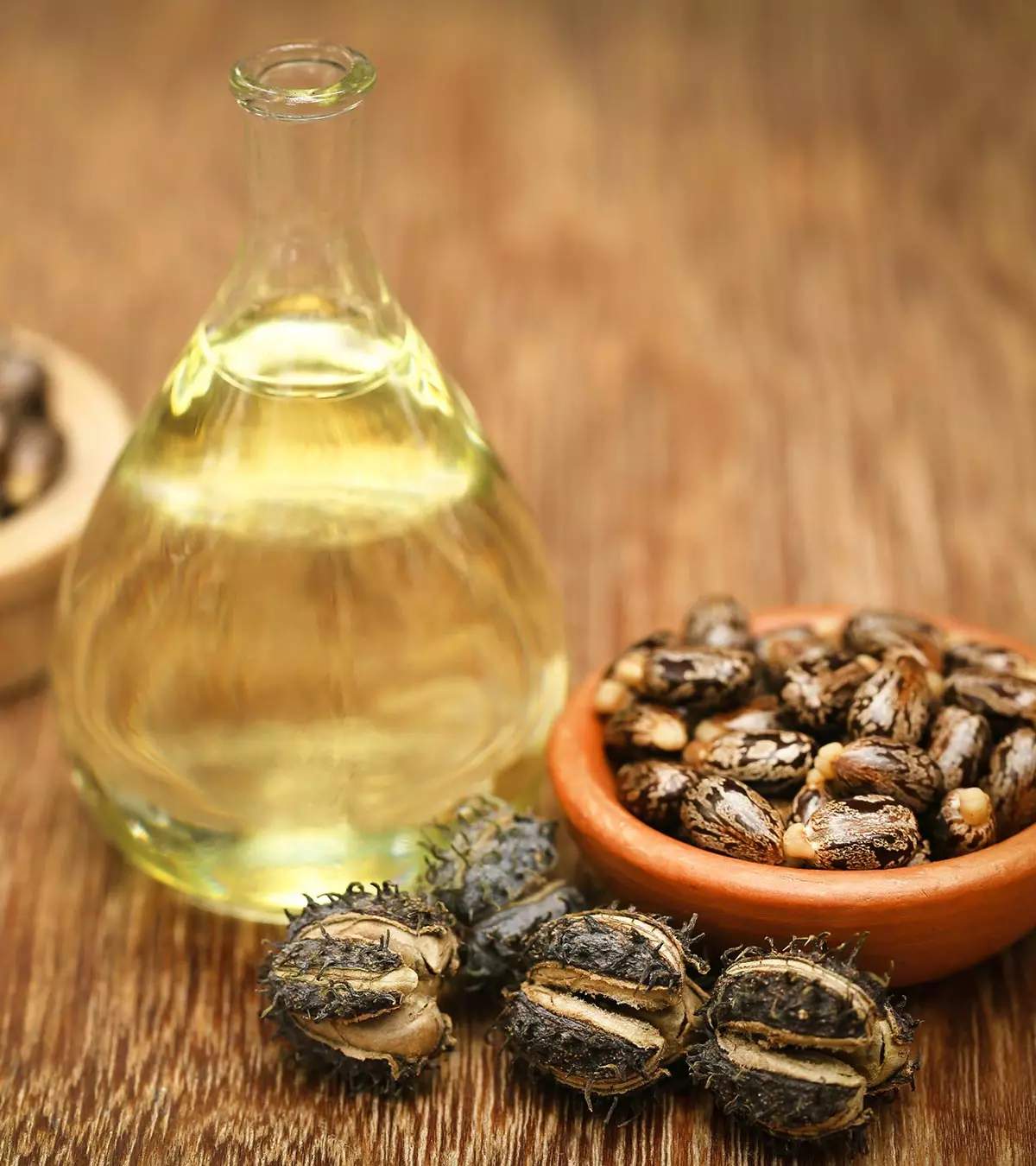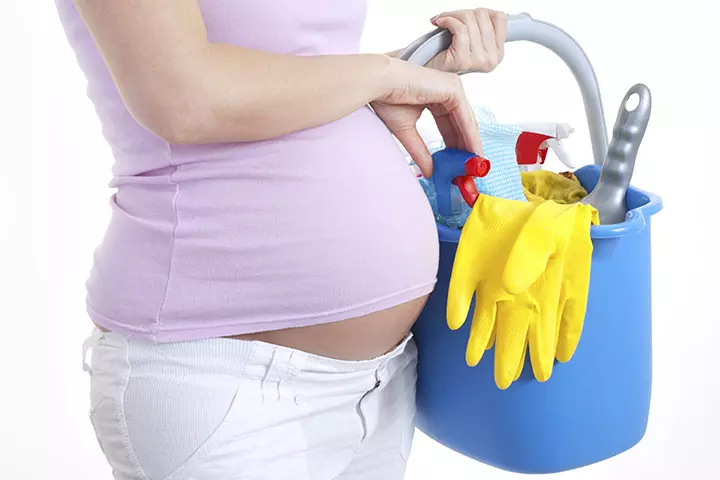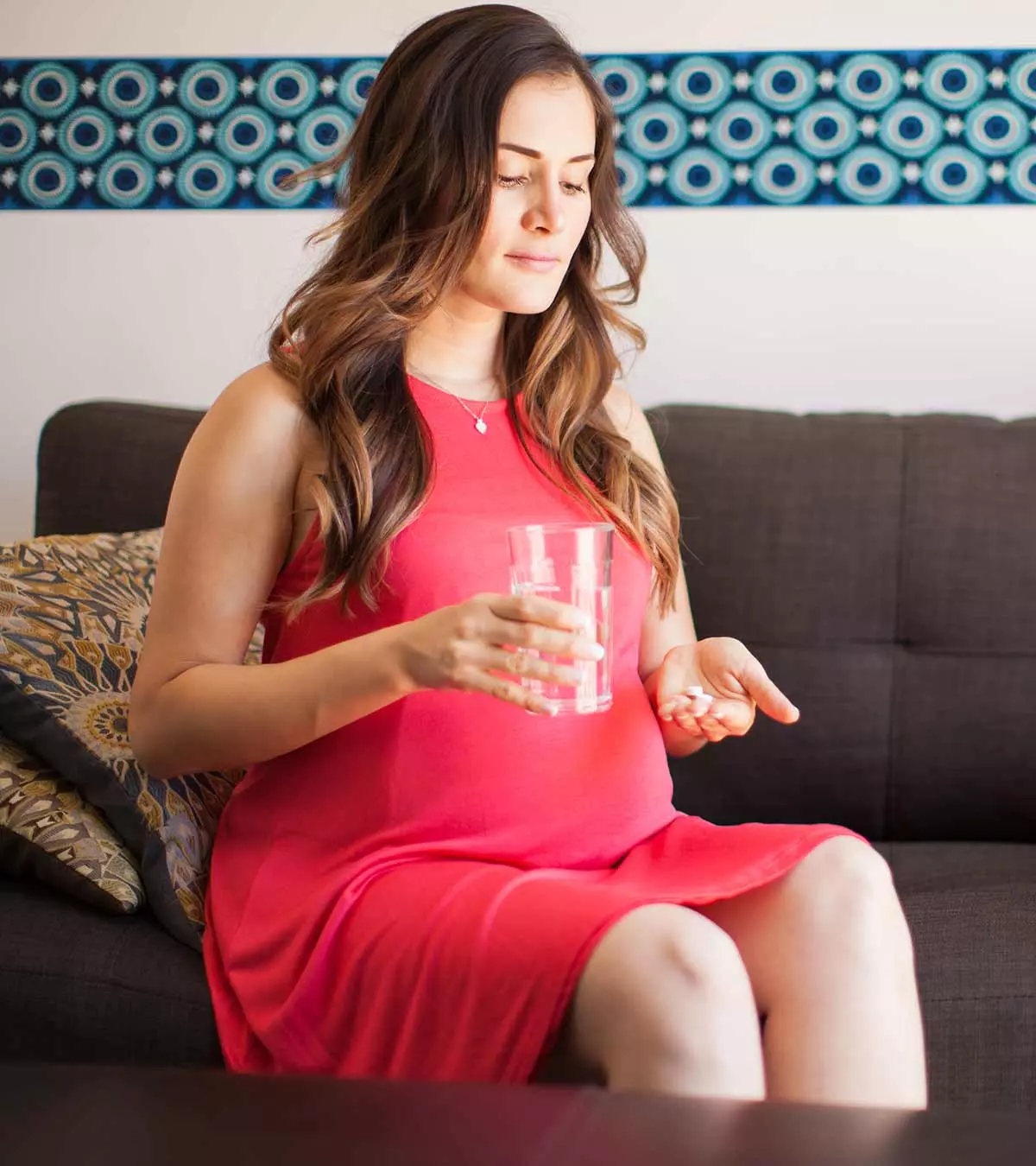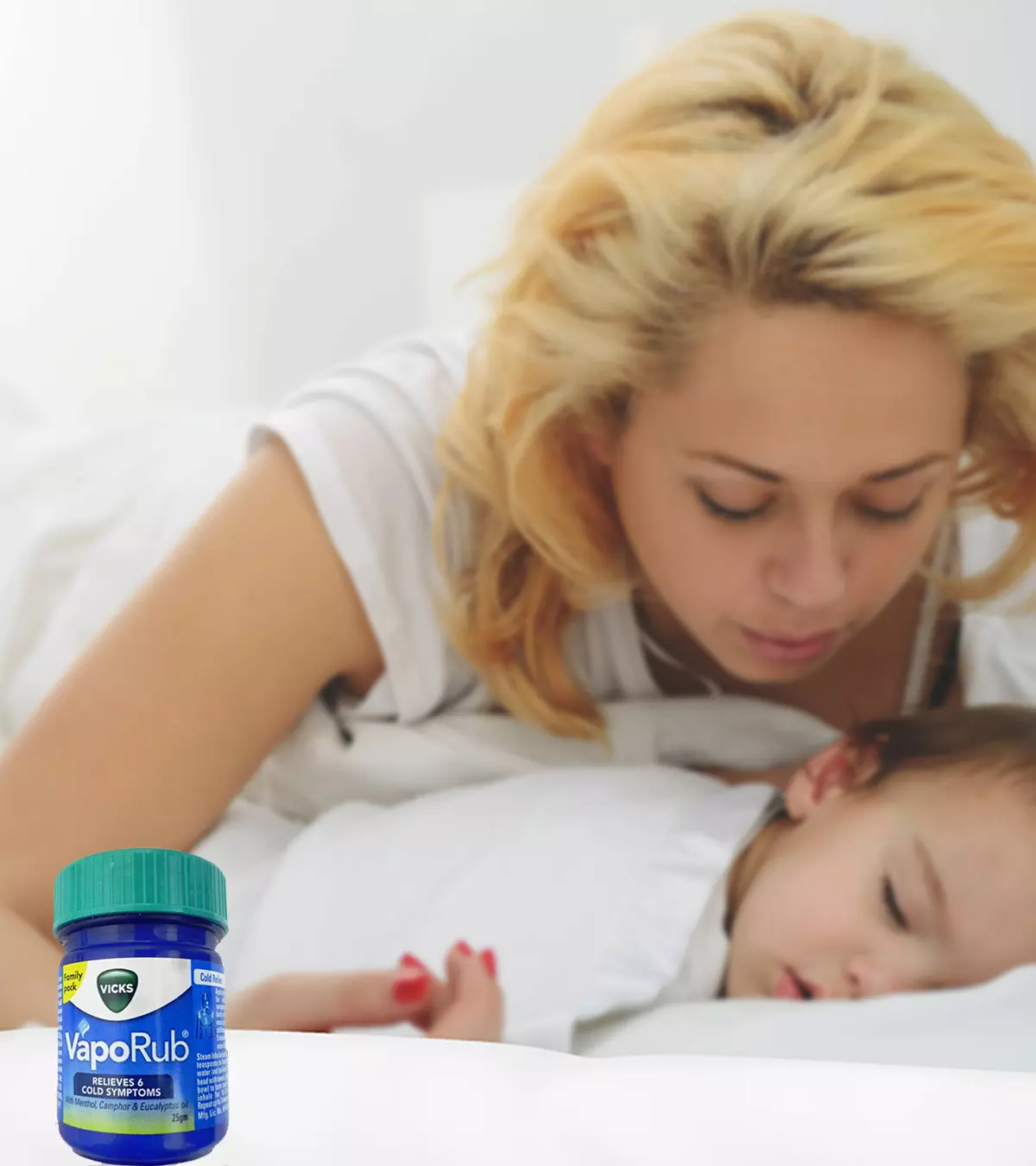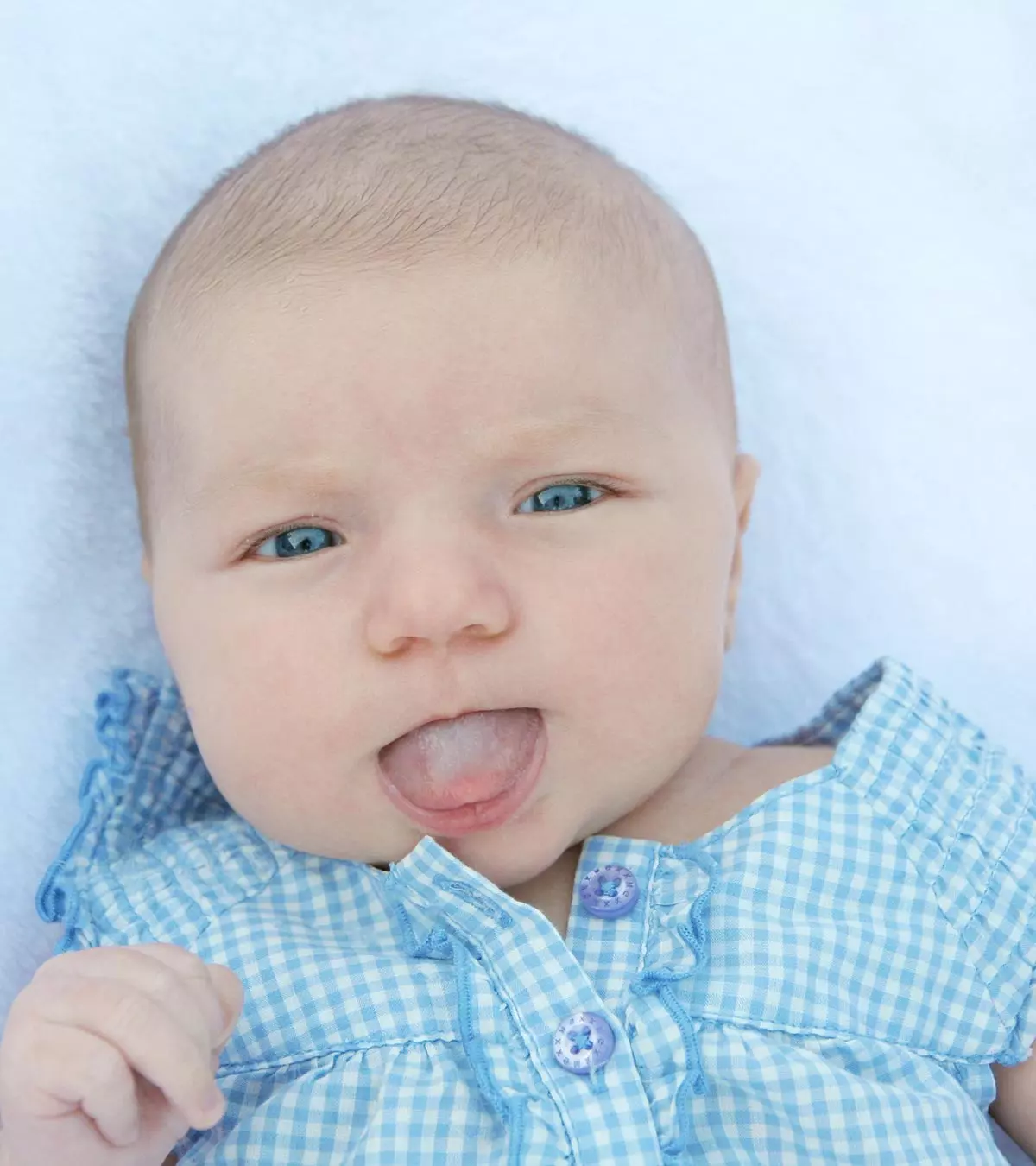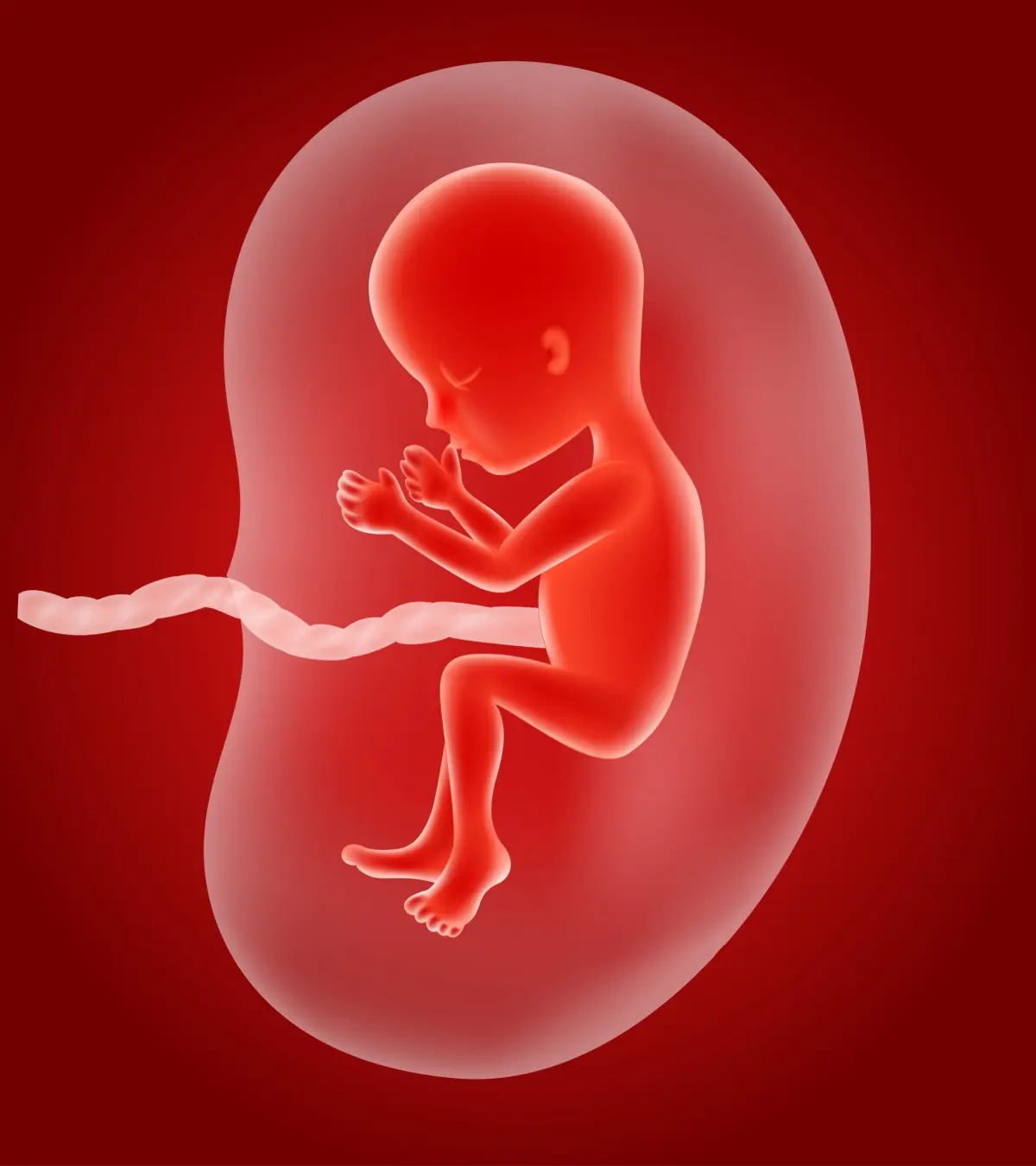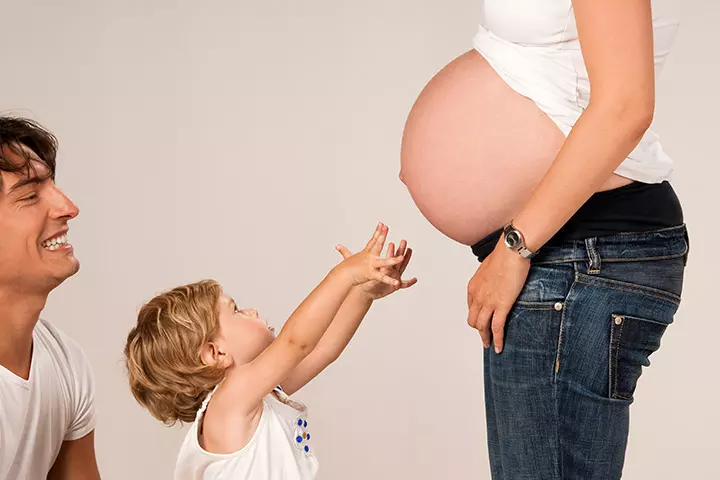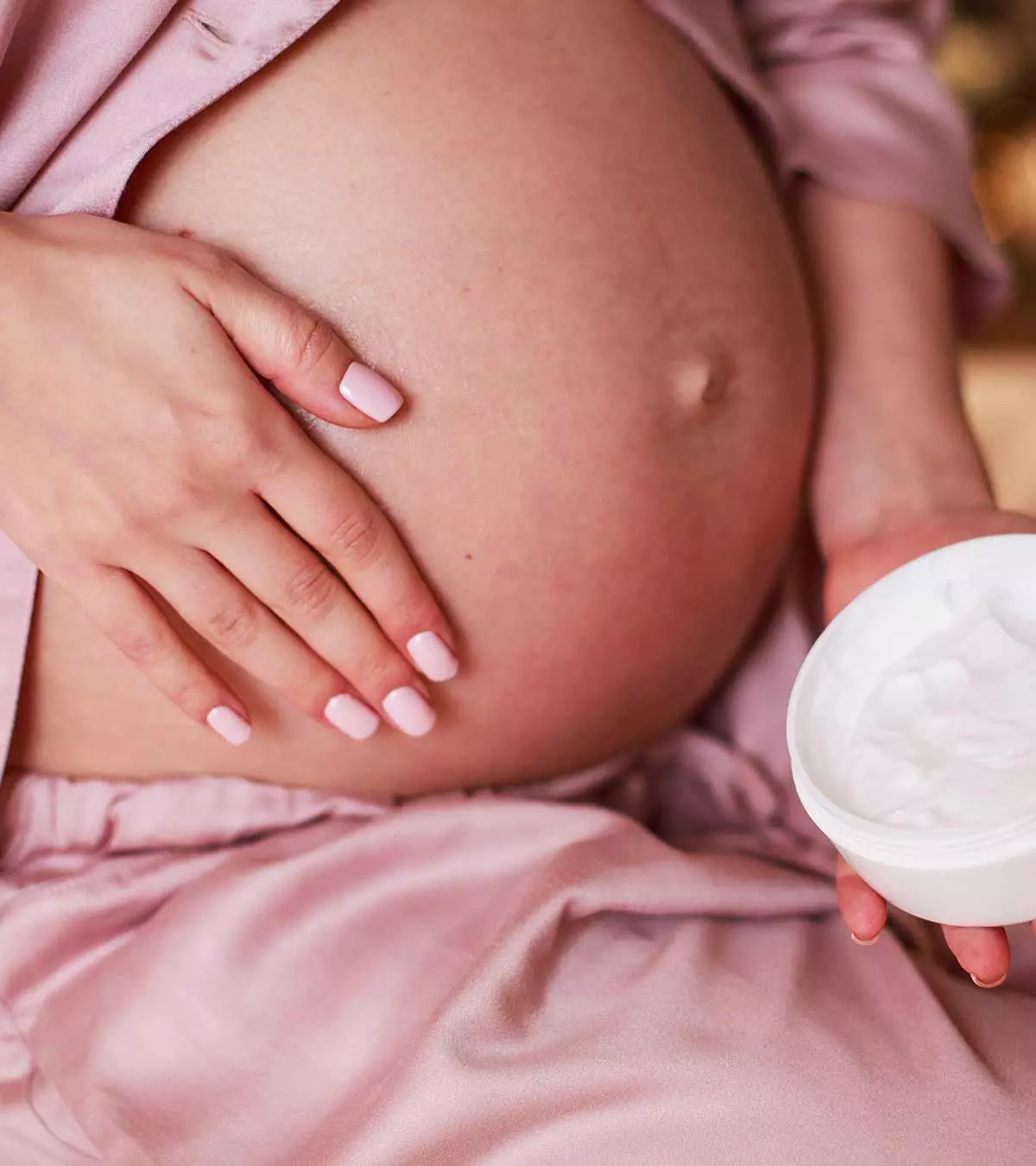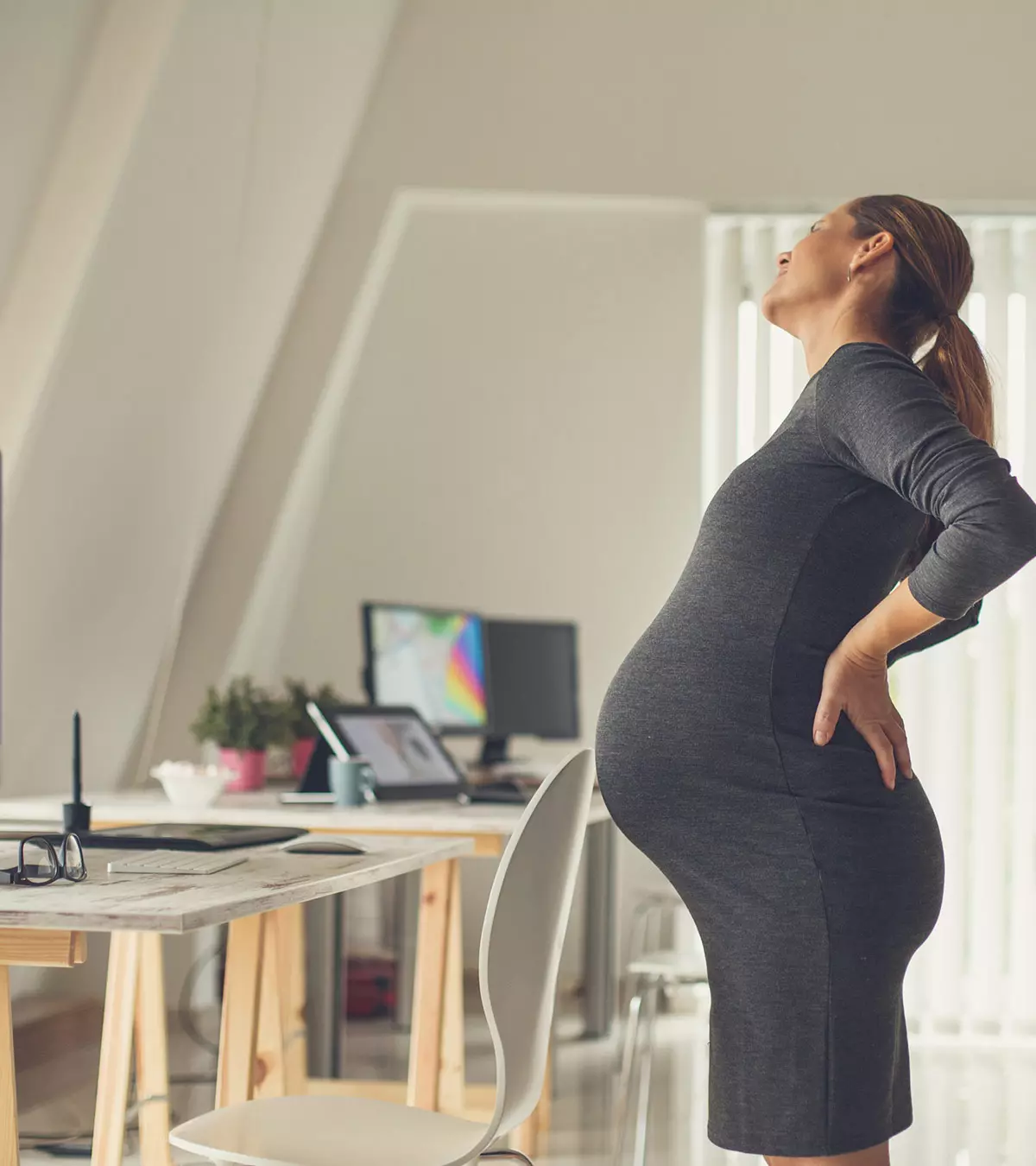
Image: iStock
The increase in hormone levels makes women prone to gallbladder pain during pregnancy. Although gallstones do not affect the baby directly, they may cause intense pain and abdominal discomfort. Thus, it is important to seek proper medical care and treatment immediately after diagnosis to avoid any future complications (1). In this post, we tell you about gallstones in expectant mothers, their causes, signs, diagnosis, treatment, and prevention techniques. While this information aims to educate about gallstones, it should not replace a thorough medical evaluation for personalized medical advice.

Key Pointers
- Pregnancy can cause gallbladder problems due to increasing hormones, weight gain, and diabetes.
- Signs and symptoms of gallbladder problems during pregnancy include intense itching, nausea, vomiting, jaundice-like symptoms, light-colored stools, dark-colored urine, and loss of appetite.
- Non-surgical treatments for gallbladder problems during pregnancy include hydration, electrolyte replacement, bowel rest, and antibiotics for infection.
- To prevent gallbladder problems during pregnancy, it’s important to have a well-balanced diet, exercise regularly, maintain a healthy weight, and manage diabetic levels.
What Is A Gallbladder?
The gallbladder is a small organ located beneath the liver. It stores the extra bile produced by the liver to digest the fats. As the food moves from your stomach, the gallbladder releases the bile juice into the small intestine to digest the fats (2).
Sometimes, bile stays in the gallbladder, hardens with time, and turns into gallstones. These stones could get into the duct and cause infection and pain (3). Pregnancy is a time when the gallbladder is vulnerable to gallstones.
A study investigating the global prevalence of gallstones in pregnancy through a systematic review and meta-analysis, which analyzed a sample size of 190,714 people, found that “The prevalence of gallstones was reported as 3.6%. The highest prevalence of gallstones by continent was reported in America, at 6.8% (4).” This suggests that gallstones are a significant concern for expectant mothers, particularly in certain regions.
What Causes Gallstones Or Other Gallbladder Diseases In Pregnancy?
Women are more likely to get gallstones or gallbladder diseases. In a study of 3,200 pregnant women at Northwestern University Feinberg School of Medicine and Yale School of Medicine, 8% of them were identified with gallstones during the third trimester and 1.2% developed symptomatic gallstone disease (5).
Women are more likely to get gallstones or gallbladder diseases. During pregnancy, any of the following factors could be responsible for the condition (6)(7)(8).
- Estrogen and progesterone hormone: In pregnancy, estrogeniA sex hormone responsible for the development of female sexual characteristics increases cholesterol secretion, and progesteroneiA female reproductive hormone that plays an important role in menstruation, pregnancy, and breastfeeding reduces bile acid secretion, which ultimately causes bile to become supersaturated with cholesterol. Progesterone slows down the emptying of the cholesterol, which promotes the formation of stones by causing bile to become stagnated. This increases the risk of gallbladder problems for pregnant women.
- Overweight: When there is more fat in the body, more estrogen is produced. Therefore, pregnant women are told to keep their weight in control for a healthy pregnancy.
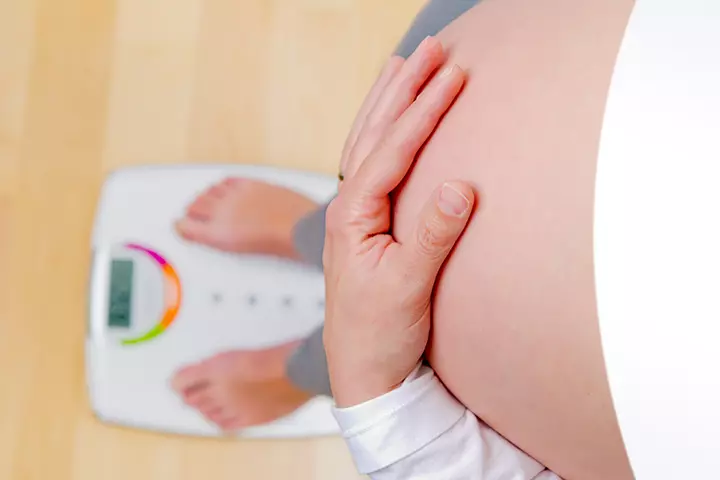
- Diabetes: The incidence of gallstones and gallbladder problems was found in people with diabetes. Hence, diabetes needs to be in control when you are pregnant.
- Others: Some other factors responsible for the formation of gallstones or gallbladder diseases in pregnancy include family history, diet, and any problems with the gallbladder.
 Point to consider
Point to considerWhat Are The Signs and Symptoms Of Gallbladder Problems In Pregnancy?
The following signs and symptoms may indicate that you could be having gallbladder problems (10):
- Intense itching (most common symptom)
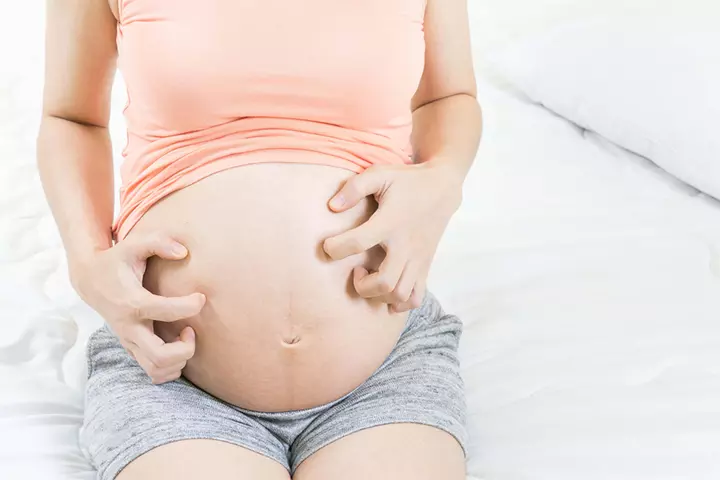
- Nausea and vomiting
- Yellowing skin and eyes (jaundice)
- Severe pain in the upper right or middle part of the abdomen. It can be aching, cramping, sharp or dull)
- Light-colored stools
- Dark-colored urine
- Fatigue
- Depression
- Loss of appetite
- Abdominal swelling
It is essential to observe your bodily changes for any symptoms of gallbladder problems in pregnancy to treat them in time. These signs could be due to one or more kinds of gallbladder problems in pregnancy. Seek immediate medical help for severe abdominal pain, ongoing vomiting, or jaundice symptoms, as these could signal serious complications needing urgent care.
 Be watchful
Be watchfulTypes Of Gallbladder Problems During Pregnancy
There are different types of gallbladder problems that could result from infection, inflammation, and blockage, resulting in severe abdominal pain during pregnancy.
1. Gallstones
If there are not enough bile salts or there is extra cholesterol, or if the gallbladder does not empty out its contents properly, it could lead to the formation of gallstones, a condition that is also known as cholelithiasis. Gallstones are usually composed of calcium bilirubinate, cholesterol, and calcium carbonate (7) (12).
The progesterone hormone produced during pregnancy could cause the body’s muscular tissue to relax. Therefore, the bile slows down, leading to the development of gallstones and inflammation of the gallbladder (cholecystitis) (8) (13). It can further increase the risk of the following conditions during pregnancy (14) (15):
- Choledocholithiasis (gallstones in the bile duct)
- Cholangitis (inflammation of the biliary tract)
- Pancreatitis (inflammation of the pancreas)
2. Cholestasis
The slowing down or stop in the flow of bile is known as cholestasis (reduced flow of bile). Cholestasis in pregnancy is also called obstetric cholestasis or intrahepatic cholestasis of pregnancy (ICP). Genetic factors, hormones, and environmental influences have been suggested as possible reasons for the development of this condition (16). It is sometimes referred to as extrahepatic cholestasis (that occurs outside the liver) and intrahepatic cholestasis or obstetric cholestasis (that occurs inside the liver).
It usually occurs in the late second and third trimesters. Intense itching in the soles of feet and palms is a common symptom of cholestasis. You may also notice the following signs and symptoms:
- Pale feces
- Dark urine
- Jaundice (yellow skin and eyes)
ICP is diagnosed when the total bile acids (TBA) or serum bile acids levels are at 10umol/L or above (17). Though it does not cause significant risk for maternal health, it is recommended that you get immediate medical help, since this may lead to complications such as meconiumiThe first stool produced by newborns after birth in the amniotic fluid (meaning the baby passes the stool before its birth), stillbirth, and premature birth (18)(19).
3. Biliary colic
Biliary colic is also called a gallbladder attack or gallstone attack. This is a sudden pain due to the blockage of the cystic duct. The flow of bile from the cystic duct to the liver can be blocked from gallstones or functional disorders of the biliary tract. Non-release of bile means the failure of fats to digest in the small intestine. It may occur after a heavy meal and frequently during the night.
It is usually felt as shooting upper right quadrant pain above the abdomen and may radiate to the right shoulder and back, which may last for a few minutes to several hours. You may even have nausea and vomiting (20).
4. Gallbladder sludge/ Biliary sludge
It mostly happens when the gallbladder is filled with excess cholesterol and not enough bile. Bile is like a soap, which emulsifies fats so that they can be absorbed into the digestive tract. If there is not enough bile, the remaining fat turns sludgy too, referred to as gallbladder sludge.
The primary symptom of gallbladder sludge can be abdominal pain, usually after a meal. Nausea, vomiting, and clay-like stools are other symptoms of biliary sludge. However, some may not have any symptoms.
In some cases, sludge thickens and forms into gallstones. And in some, it goes on its own. Biliary sludge is a frequent finding in pregnancy and often disappears after delivery (21). But if it remains persistent, the doctor may prescribe medications. The surgical removal of the gallbladder is recommended if it causes severe biliary colic or complicates to cholecystitis, cholangitis, and pancreatitis (22) (23).
Diagnosis And Tests For Gallbladder Problems
You may mistake the gallbladder disease symptoms like morning sickness that occurs in the first trimester. Your doctor may perform an ultrasound to test for gallbladder problems (24). The following tests are also used to diagnose gallstones and other gallbladder diseases during pregnancy (25)
- Blood tests: It could give evidence of infection as well as liver and pancreatic function. A high count of white blood cells is associated with an abscessiA painful cavity anywhere on the body, filled with infected tissue (pus), often caused by an infection , inflammation, ruptured gallbladder, or an infection. Additionally, liver function tests, including enzymes, bilirubiniA byproduct of old broken down red blood cells, found in the liver, that is excreted from the body , CRP, ESR, and lipaseiEnzyme secreted by the pancreas, stomach, and salivary glands to break down fat in food for its absorption by the intestines , are also checked to determine gallbladder problems.
- Ultrasound scan: It is 95% effective in diagnosing gallstones during pregnancy, and has no risk of radiation exposure (26). The professional can get a good view of the bile duct and gallbladder through ultrasound imaging. It is a preferred imaging method for detecting gallbladder diseases during pregnancy.
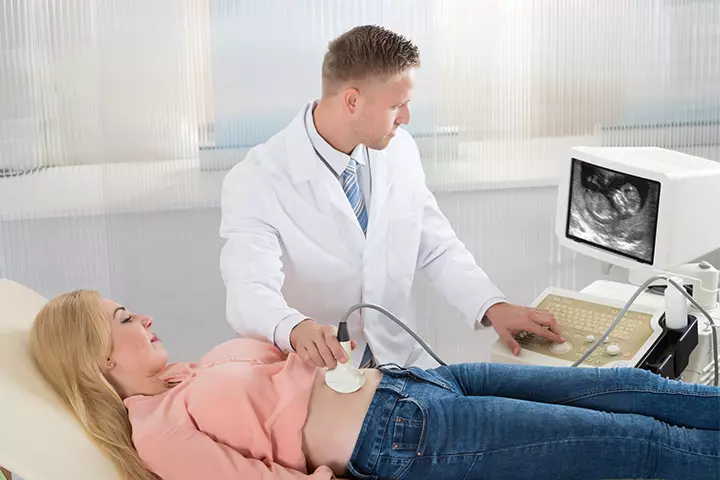
- Computed tomography (CT): Any inflammation in the gallbladder or rupture of the gallbladder can be noticed through this procedure. However, it is avoided during pregnancy due to exposure to radiation.
- Magnetic resonance imaging (MRI): MRI may be preferred over CT scan if the ultrasound could not give detailed information about gallbladder problems. It is without the risk of radiation, and there is no proven risk from MRI to a pregnant woman or fetus.
- Magnetic resonance cholangiopancreatography (MRCP): It is a noninvasive procedure that helps in the diagnosis of gallbladder problems without the use of radiation. There is no known risk during pregnancy.
- Endoscopic retrograde cholangiopancreatography (ERCP): ERCP helps to diagnose diseases of bile and pancreatic duct. It is recommended in pregnancy if there is recurrent biliary colic, abnormal liver function tests, or dilated bile ducts on ultrasound examination. However, this is recommended for therapeutic purposes rather than diagnosis alone.
Based on the problem detected, the doctor recommends the treatment method.
Treatment For Gallbladder Problems During Pregnancy
Clinical management of gallstones and other gallbladder problems in a pregnant woman can be based on gestational age, maternal and fetal benefits, and severity of symptoms. Though the relapse of gallbladder disease is high in the first trimester, conservative medical management is preferred during the first and third trimesters (26).
Your doctor may often delay the surgical management of non-acute cases to the second trimester or until postpartum to reduce the risk of spontaneous abortion and premature birth (20). However, advanced surgical techniques may have improved outcomes than conservative management.
Non-surgical treatments
Conservative management mainly includes gallbladder pain management and may help relieve other symptoms of gallstones or other gallbladder diseases during pregnancy. This includes (26) (27) (28):
- Use of intravenous fluids for dehydration
- Correction of electrolyte imbalance
- Bowel rest
- Narcotics for pain relief: NSAIDs are not recommended for pregnant women, so intravenous meperidine is preferred for analgesia
- Medication for itching: Ursodeoxycholic acid (UDCA) or ursodiol is given to reduce the itching. It helps to increase bile flow and dissolve gallstones. Normal treatments for the itch, such as antihistaminesiA medication that helps to relieve symptoms caused by allergies or hydrocortisoneiA class of corticosteroids medication used for skin conditions such as redness, itchiness, and rashes creams, are not effective in relieving itch resulting from cholestasis.
- Broad-spectrum antibiotics to prevent infections
- Fat restricted diet
You may require a few days of hospitalization during gallstones and other gallbladder diseases. During this time, fetal monitoring would be performed to assess their biophysical profile, and the next course of action would be determined based on the benefits and risks for both the mother and the fetus.
Surgical treatments
Surgical interventions in pregnancy should minimize fetal risks without compromising the safety of the mother and fetus. Your obstetrician/gynecologist, and hepatologist may recommend surgical removal of the gallbladder (cholecystectomy) to relieve gallbladder pain and other symptoms if you have acute cholecystitis, acute biliary colic, or relapsing symptoms (26).
The surgical techniques to manage gallbladder problems are:
1. Laparoscopic Cholecystectomy
Laparoscopic cholecystectomy is the surgical removal of the gallbladder through smaller incisions using tubes like devices and cameras. It can also be beneficial to remove gallstones in the biliary tract causing pancreatitis in pregnant women. Laparoscopic surgery can be less painful and also aids faster recovery compared to open surgery (29) (30).
According to the Society of American Gastrointestinal and Endoscopic Surgeons, pregnant women may undergo laparoscopic removal of the gallbladder in any trimester without an increased risk to the mother or fetus. However, the decision of treatment varies based on maternal and fetal outcomes (31).
2. Open Cholecystectomy
Open cholecystectomy is the surgical removal of the gallbladder through an abdominal incision. Though laparoscopic cholecystectomy is safe in all trimesters, open surgery may be recommended for pregnant women, especially those who are in the third trimester, because laparoscopic port placement and insufflation of abdominal cavity with gas may be difficult.
However, few studies show that cholecystectomy in the third trimester increases the risk of preterm delivery and related complications, and it is recommended to operate in the postpartum period if possible to manage conservatively (1) (31).
3. Endoscopic Retrograde Cholangiopancreatography (ERCP)
Choledocholithiasis is the presence of gallstones in the common bile duct causing bile duct obstruction. These gallstones can be removed by ERCP (endoscopic retrograde cholangiopancreatography), a procedure in which a thin and flexible tube is run through your mouth to the opening of the common bile duct.
It injects a dye, and a small camera at the end of the tube gives a better view of the stones. The stones are then removed through the tube. The abdomen is covered during this procedure so that the radiation will not harm the fetus. ERCP is considered safer and effective during pregnancy (32).
How To Prevent Gallbladder Problems In Pregnancy?
The following changes in lifestyle and diet may help you prevent gallstones and other gallbladder diseases in pregnancy (33).
- Try to keep your weight in control. Eat right, and avoid binge eating.
- Have a healthy routine and exercise every day. Yoga, walking, and stretching exercises can help. Keep your body fit and flexible to avoid pregnancy complications.

Your diet also plays a role in preventing gallbladder problems. Continue reading to know about it.
Gallbladder Diet During Pregnancy
Diet can play a major role in reducing the severity of gallbladder problems if you are already experiencing conditions such as gallstones. Nutrition and lifestyle changes may be beneficial to prevent obesity that increases the risk of gallstone formation. The following changes in your diet may reduce your risk for gallstones and other gallbladder diseases (34) (35):
1. Limit your fat consumption
Fatty meals and foods may trigger a reaction in the gallbladder, and it could increase the pain. Therefore, limiting your dietary fat may alleviate gallstone symptoms. For instance, choose light meat and skinless poultry instead of red meat, and low-fat yogurt in place of cooking oils. These modifications in the diet may lower the risk of a gallbladder attack and help you maintain a healthy weight.
Alexandra, a mother and vlogger, shares the steps she took to prevent gallbladder attacks while pregnant. She says, “ I had two gallbladder attacks in the past and treated them fine, but because I’m pregnant, I can’t do the treatment I did then, which was to drink a lot of Epsom salts. I think that would be quite dangerous to do when you’re pregnant. I’m not sure—maybe it’s okay—but I wouldn’t feel comfortable doing that while I’m pregnant. Anyway, like the past week, I’ve been feeling pain in my gallbladder and my shoulder—my right shoulder blade, kind of up here—and the whole rib area and everything. So I know, I recognize the pain of it now and other symptoms I get…I have been trying to cut out fat from my diet because basically, the gallbladder attacks happen because my gallbladder is not good at digesting fat. So I have to be very, very careful as to what I eat. I have to make sure that nothing has got any oil in it—milk, you know—just no fat at all (i).”
2. Consume more fiber
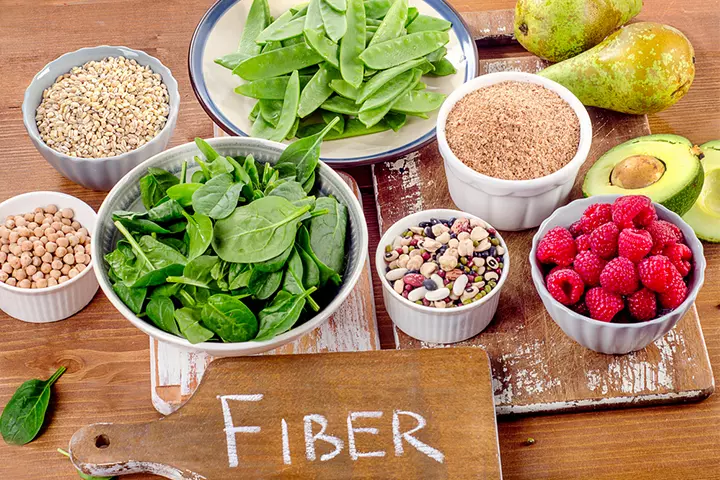
Eat whole grains, fruits, and vegetables. They assist in the digestion process and may decrease gallbladder infection. The following foods may add more fiber to your diet:
- Eat four to five cups of fruits or veggies every day
- Use vitamin-rich veggies such as tomatoes and baby spinach in the sandwich, instead of mayonnaise or cheese
- Add a handful of dried apricots to a cup of oatmeal
- Berries, avocados, broccoli, kale, and all dark-colored fruits and veggies are good options
- Add nuts, such as peanuts or cashews, to your everyday diet as these can help reduce the risk of developing gallstones.
3. Hydrate yourself
Drink plenty of water. Keeping yourself hydrated helps flush away toxins and unwanted residues from the body. It also improves digestion. However, avoid sweetened beverages and sodas as they contain extra calories. Instead, choose plain water with a twist of lemon.
4. Eat whole foods
Fresh and whole foods are healthy alternatives to processed and refined foods.
- Eliminate highly processed foods containing trans fats, preservatives, and other additives
- Avoid packaged items such as crackers, chips, and cakes
- Try making your snacks such as fruit or vegetable slices, sandwich, and sprouts
In the next section, we have some common questions answered for you.
Frequently Asked Questions
1. Can gallstones harm my unborn baby?
Though gallstones may not directly affect the baby, the consequences of the disease could do. If you experience pain in the gallbladder for more than five hours, or severe symptoms of inflammation, infection, nausea, and vomiting, they will restrict you from having nutritious food, thus hampering the baby’s growth.
2. What can happen if gallstones are not treated?
- Gallstones may cause spells of gallbladder pain if not treated in time. They also lead to inflammation of the gallbladder, also known as cholecystitis. In rare cases, it can become infected and lead to an abscess.
- If the gallstones block the bile duct, resisting bile flow from the liver, it can lead to jaundice. They may also affect the release of pancreatic juices, causing pancreatitis (inflammation of the pancreas) (15).
3. Do gallbladder problems recur after pregnancy?
Gallbladder problems may not appear for two to four months after delivery due to the changing levels in the pregnancy hormones. But sometimes, rapid weight loss after delivery may result in excess cholesterol, and it could increase the risk of gallstones. Therefore, book for a postpartum follow-up if you have had gallbladder problems while pregnant.
4. Is pregnancy possible after gallbladder removal?
Yes, you can get pregnant after the surgical removal of the gallbladder. There are no complications if you conceive. However, it is recommended to take enough rest and abstain from physical work while recovering. You may have to follow dietary changes after gallbladder removal to avoid bloating and abdominal pain (36).
5. Will they remove my gallbladder if I am pregnant?
Gallstones that prevent the bladder from emptying or induce infection require surgery. Research has found that mothers experiencing cholecystitis (inflammation of the gallbladder) during pregnancy experienced better results if they had surgery than if it was delayed until childbirth (37). However, it has also been found that women who have their gallbladder removed during pregnancy have more chances of experiencing after-surgery complications, such as longer hospital stays and preterm delivery, than those who delay the operation. This is mainly for those women who undergo cholecystectomy surgery (38).
6. Can gallstones cause miscarriage?
If a pregnant woman develops a complex gallstone disease, acute cholecystitis, and gallstone pancreatitis, it increases her and the fetus’s mortality risk. The laparoscopic cholecystectomy surgery to remove the gallbladder during the second trimester can lead to a greater risk for preterm labor and spontaneous abortion (1). Although gallstones do not affect the unborn baby, they can lead to infection, nausea, and vomiting in the pregnant woman. It, in turn, prevents proper nourishment of the baby.
7. Can pregnancy irritate my gallbladder?
Yes. Pregnancy may lead to various gallbladder problems. The greater progesterone levels during pregnancy interfere with the usual functioning of the gallbladder, causing gallstones and liver problems. A family history of this disease, being overweight, and a high-fat or high-cholesterol diet are common risk factors for gallbladder problems during pregnancy. Many pregnant women experience silent gallstones, which means there are no symptoms of the condition. It is diagnosed only when medical imaging is done.
Pregnant women are at higher risk of developing gallstones and other gallbladder diseases due to estrogen and progesterone hormone production changes. Women who are overweight and diabetic are also at higher risk. Gallbladder pain during pregnancy is treated based on gestation period, symptoms, and maternal and fetal benefits. Non-surgical treatments are recommended during the first and third trimesters. However, you may require surgical treatments in the second trimester or post-delivery in some cases. Consult your doctor if you notice symptoms such as yellowed eyes and skin, dark urine, and excessive itching.
Infographic: Risk Factors For Gallstones While Pregnant
One of the most common gallbladder problems during pregnancy is gallstones. Several studies suggest that pregnant women are at an increased risk of gallstones due to various factors. Here is an infographic to help you comprehend the possible risk factors for developing gallstones during pregnancy. Illustration: Momjunction Design Team
Personal Experience: Source
MomJunction articles include first-hand experiences to provide you with better insights through real-life narratives. Here are the sources of personal accounts referenced in this article.
i. Pregnancy Update 25 Weeks Pregnant • Gallbladder attack • Baby #8.https://youtu.be/r-f4SFb3w0w?feature=shared
References
- Mehmet İlhan et.al; (2016); The course and outcomes of complicated gallstone disease in pregnancy: Experience of a tertiary center.
https://pmc.ncbi.nlm.nih.gov/articles/PMC5558289/ - Gallbladder.
https://muschealth.org/medical-services/ddc/patients/digestive-organs/gallbladder - Gallstones (Cholelithiasis).
https://www.ncbi.nlm.nih.gov/books/NBK459370/ - Nader Salari et.al; (2025); The global prevalence of gallstones in pregnancy: A systematic review and meta-analysis.
https://www.sciencedirect.com/science/article/pii/S2590161323000625 - Steven J. Schwulst and Moeun Son; (2025); Management of Gallstone Disease During Pregnancy.
https://jamanetwork.com/journals/jamasurgery/article-abstract/2771042 - Sabeha Al-Bayati and Shaker Kodayer; (2012); Gallstones in a group of Iraqi patients with type 2 diabetes mellitus.
https://pubmed.ncbi.nlm.nih.gov/22485237/ - Gabriel E Njeze; (2013); Gallstones.
https://pmc.ncbi.nlm.nih.gov/articles/PMC3899548/ - Laura M Stinton and Eldon A Shaffer; (2012); Epidemiology of Gallbladder Disease: Cholelithiasis and Cancer.
https://pmc.ncbi.nlm.nih.gov/articles/PMC3343155/ - Stela Celaj and Themistoklis Kourkoumpetis; (2025); Gallstones in Pregnancy.
https://jamanetwork.com/journals/jama/fullarticle/2781051#:~:text=Increased%20hormones%20during%20pregnancy%20can - 10 Symptoms to Look for when Dealing with Gallbladder Disease.
https://blog.lonestarfamily.org/10-symptoms-to-look-for-when-dealing-with-gallbladder-disease - Gallbladder Disease.
https://www.hopkinsmedicine.org/health/conditions-and-diseases/gallbladder-disease - Ji-Kuen Yu et.al; (2013); Calcium content of different compositions of gallstones and pathogenesis of calcium carbonate gallstones.
https://pubmed.ncbi.nlm.nih.gov/23270822/ - C Chloptsios et.al; (2007); Cholecystitis during pregnancy. A case report and brief review of the literature.
https://pubmed.ncbi.nlm.nih.gov/18225691/ - Indu Lata; (2013); Hepatobiliary diseases during pregnancy and their management: An update.
https://pmc.ncbi.nlm.nih.gov/articles/PMC3883195/ - Capecomorin S Pitchumoni and Balaji Yegneswaran; (2009); Acute pancreatitis in pregnancy.
https://pmc.ncbi.nlm.nih.gov/articles/PMC2789215/ - Pregnancy Intrahepatic Cholestasis.
https://www.ncbi.nlm.nih.gov/books/NBK551503/ - Diagnosis of Intrahepatic Cholestasis of Pregnancy (ICP).
https://icpcare.org/intrahepatic-cholestasis-pregnancy/diagnosis/ - Victoria Geenes and Catherine Williamson; (2009); Intrahepatic cholestasis of pregnancy.
https://pmc.ncbi.nlm.nih.gov/articles/PMC2678574/ - Cholestasis of Pregnancy.
https://www.urmc.rochester.edu/encyclopedia/content?ContentTypeID=90&ContentID=P02440 - Biliary colic.
https://www.health.harvard.edu/a_to_z/biliary-colic-a-to-z - Alberto Maringhini et.al; (1993); Biliary Sludge and Gallstones in Pregnancy: Incidence, Risk Factors, and Natural History.
https://www.acpjournals.org/doi/10.7326/0003-4819-119-2-199307150-00004 - Rajeev Jain; (2004); Biliary Sludge: When Should It Not be Ignored?
https://pubmed.ncbi.nlm.nih.gov/15010024/ - E A Shaffer; (2001); Gallbladder sludge: what is its clinical significance?
https://pubmed.ncbi.nlm.nih.gov/11276386/ - Liver Panel Test.
https://www.testing.com/tests/liver-panel/ - Matthew T. Heller et.al; (2011); Imaging of Hepatobiliary Disorders Complicating Pregnancy.
https://www.ajronline.org/doi/full/10.2214/AJR.10.5128 - Surgical and Nonsurgical Management of Gallstones.
https://www.aafp.org/pubs/afp/issues/2014/0515/p795.html - J Palma et.al; (1997); Ursodeoxycholic acid in the treatment of cholestasis of pregnancy: a randomized, double-blind study controlled with placebo.
https://pubmed.ncbi.nlm.nih.gov/9453428/ - George Gilson et.al; (2004); Ursodiol treatment of cholestasis of pregnancy.
https://www.ajog.org/article/S0002-9378(04)01400-0/fulltext - Hadi Ahmadi Amoli et.al; (2008); Laparoscopic cholecystectomy during pregnancy: A case series.
https://pmc.ncbi.nlm.nih.gov/articles/PMC2699057/ - Young W Kim et.al; (2006); Laparoscopic Common Bile Duct Exploration in Pregnancy With Acute Gallstone Pancreatitis.
https://pmc.ncbi.nlm.nih.gov/articles/PMC3015667/ - Guidelines for the Use of Laparoscopy during Pregnancy.
https://www.sages.org/publications/guidelines/guidelines-for-diagnosis-treatment-and-use-of-laparoscopy-for-surgical-problems-during-pregnancy/ - Sreyram Kuy et.al; (2009); Outcomes following cholecystectomy in pregnant and nonpregnant women.
https://pubmed.ncbi.nlm.nih.gov/19628096/ - Vítor Magno-Pereira et.al; (2017); Demystifying endoscopic retrograde cholangiopancreatography (ERCP) during pregnancy.
https://www.ejog.org/article/S0301-2115(17)30468-2/abstract - Eating, Diet, & Nutrition for Gallstones.
https://www.niddk.nih.gov/health-information/digestive-diseases/gallstones/eating-diet-nutrition - Prevention- Gallstones.
https://www.nhs.uk/conditions/gallstones/prevention/ - Andrea Socorro Álvarez-Villaseñor et.al; (2017); Cholelithiasis during pregnancy and postpartum: prevalence, presentation, and consequences in a Referral Hospital in Baja California Sur.
https://pubmed.ncbi.nlm.nih.gov/28474701/ - Surgery During Pregnancy for Gallbladder Infections May be Safer than Postponing.
https://www.jefferson.edu/about/news-and-events/2025/8/surgery-for-cholecystitis-during-pregnancy-safer-than-waiting.html#:~:text=Alumni- - Zhi Ven Fong et.al; (2019); Cholecystectomy During the Third Trimester of Pregnancy: Proceed or Delay?
https://pubmed.ncbi.nlm.nih.gov/30769111/
Community Experiences
Join the conversation and become a part of our nurturing community! Share your stories, experiences, and insights to connect with fellow parents.
Read full bio of Dr Sachchidananda Maiti
Read full bio of Rebecca Malachi
Read full bio of Swati Patwal
Read full bio of Aneesha Amonz





